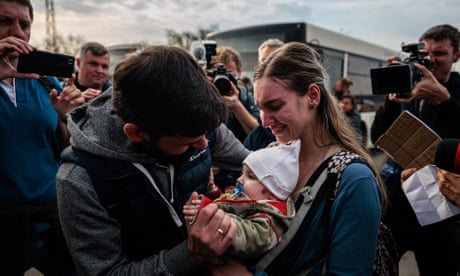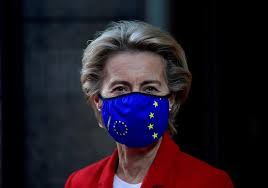Ursula von der Leyen has proposed a total ban on Russian oil imports to the EU, saying Vladimir Putin had to pay a “high price for his brutal aggression” in Ukraine.
Member states in Brussels are scrutinising a proposed sixth package of sanctions, but in a speech on Wednesday the European Commission president said Russian oil flows had to stop.
Von der Leyen said Russian supply of crude oil would be prohibited within six months and refined products would be banned by the end of the year, while she acknowledged the demands from countries such as Slovakia and Hungary for additional flexibility.
“Let us be clear: it will not be easy,” Von der Leyen said in a speech to the European parliament. “Some member states are strongly dependent on Russian oil. But we simply have to work on it. We now propose a ban on Russian oil. This will be a complete import ban on all Russian oil, seaborne and pipeline, crude and refined.
“We will make sure that we phase out Russian oil in an orderly fashion, in a way that allows us and our partners to secure alternative supply routes and minimises the impact on global markets.”
Russian imports account for 25% of oil imports to the EU and are a major source of revenue for the Kremlin but the level of dependency varies and Slovakian and Hungarian ministers have already said they will seek exemptions from the proposals.
The sanctions package will require unanimous support from the EU member states whose representatives in Brussels have already started to pore over the details with the hope of coming to an agreement by the end of the week.
As Von der Leyen sought to rally the EU to take the next step, she littered her speech with the names of Ukrainian cities and towns that had been subject to brutal Russian bombardments or where evidence of war crimes had been uncovered.
She told MEPs the EU should additionally target military figures involved in the massacre of civilians in the town of Bucha, north of Kyiv, and siege of the port city of Mariupol with restrictive measures, and block Russian state television from being broadcast in the 27 member states.
“This sends another important signal to all perpetrators of the Kremlin’s war: we know who you are, and you will be held accountable,” she said. “With all these steps, we are depriving the Russian economy of its ability to diversify and modernise.”
The EU would also remove Sberbank – Russia’s largest bank – and two other major banks from the Swift payment system, under the last sanctions package.
“Putin wanted to wipe Ukraine from the map. He will clearly not succeed,” she said. “On the contrary, Ukraine has risen up in unity. And it is his own country, Russia, he is sinking.”

The EU is preparing to be the main funder of Ukraine’s economic recovery from the war, with billions already committed, but Von der Leyen called on the US and others to match those funds.
Ukraine’s GDP was expected to fall by 30% to 50% this year alone, she said, with the IMF estimating that Ukraine would require €5bn (£4.2bn) a month “to keep the country running, paying pensions, salaries and basic services”.
“We have to support them, but we cannot do it alone,” Von der Leyen said. “I welcome that the United States announced massive budgetary support. And we, as Team Europe, will also do our share.”
She went on: “Europe has a very special responsibility towards Ukraine. With our support, Ukrainians can rebuild their country for the next generation.
“That is why today I am proposing to you that we start working on an ambitious recovery package for our Ukrainian friends. This package should bring massive investment to meet the needs and the necessary reforms. It should address the existing weaknesses of the Ukrainian economy and lay the foundations for sustainable long-term growth.”





















































